by Taylor Wilken | Mar 22, 2019
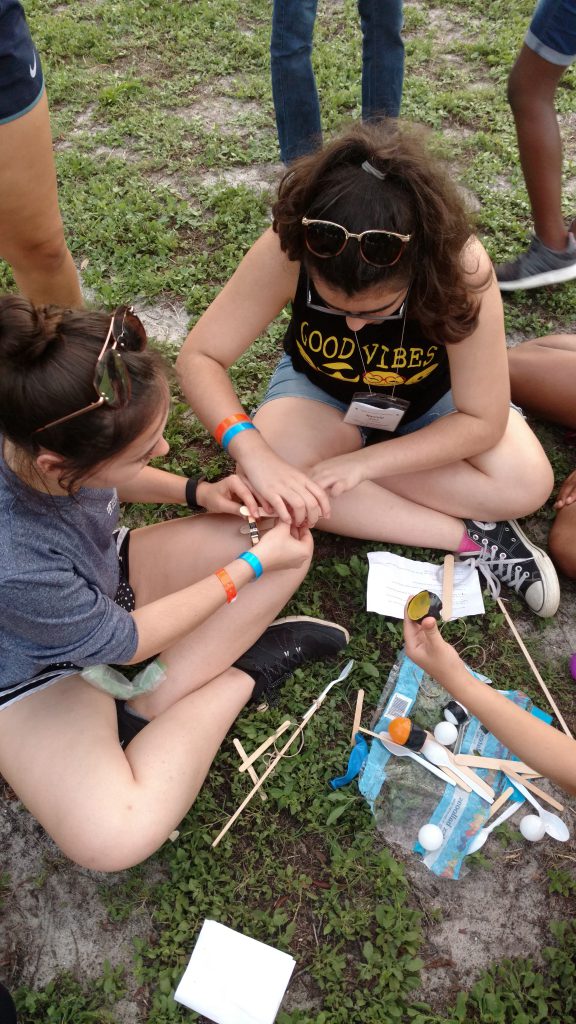 Summer camp…memories cherished and never forgotten. Camp fires, swimming, canoeing and kayaking, roughing it old-school in cabins and bunk beds, camp songs and skits around the fire, life-long memories and friendships…these are some of the experiences your child can have at 4-H Camp Timpoochee or 4-H Camp Cherry Lake this summer!
Summer camp…memories cherished and never forgotten. Camp fires, swimming, canoeing and kayaking, roughing it old-school in cabins and bunk beds, camp songs and skits around the fire, life-long memories and friendships…these are some of the experiences your child can have at 4-H Camp Timpoochee or 4-H Camp Cherry Lake this summer!
Time to Unplug
4-H summer camps are places for youth to unplug and get some fresh air while gaining valuable skills that last a lifetime. A core philosophy of 4-H camp is “letting kids be kids” by utilizing the learn-by-doing approach with a balance of routine and unstructured time within a nurturing environment where youth feel a sense of community and belonging.
Explore & Discover
Campers are encouraged to get out of their comfort zones to discover and explore their interests, talents, and values. Classes including creative dramatics, marine exploration, air rifle, mad science, and many other programs allows them to explore and excel. Campers gain confidence, empowerment, and resiliency through these new experiences. A sense of community and belonging grows from the traditional camp songs and dances they learn. New friendships are formed from the multi-county dynamic that the 4-H summer camp provides where youth meet kids from other counties and walks-of-life.
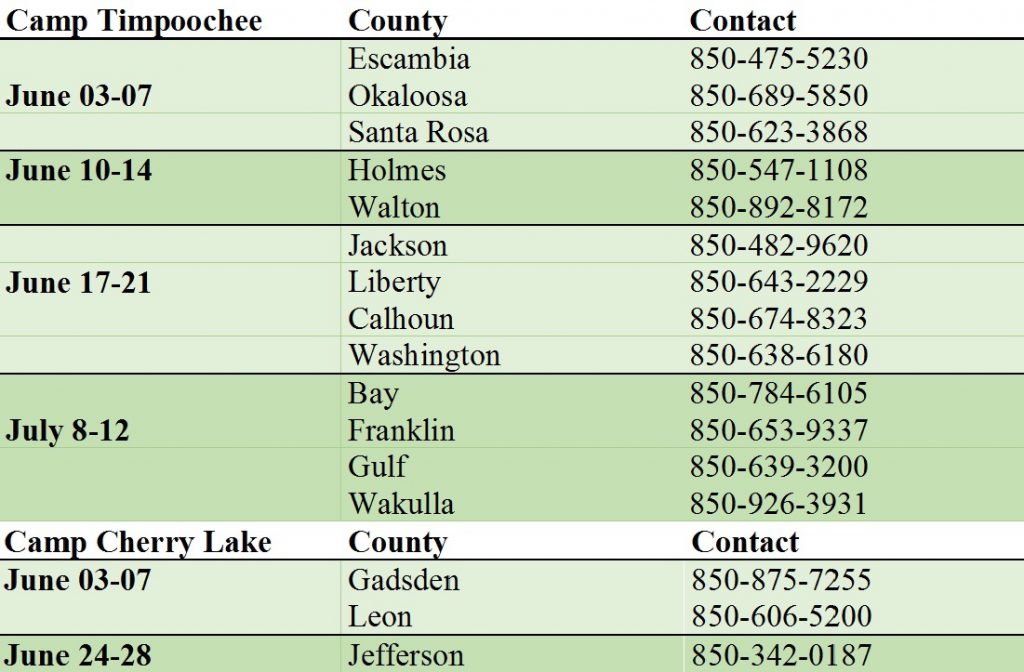
Who: Campers (8-13 years of age) & Counselors (14-18 years of age)
Where: Camp Timpoochee- 4750 Timpoochee Lane, Niceville, Florida 32578
Camp Cherry Lake- 3861 NE Cherry Lake Circle, Madison, Florida 32340
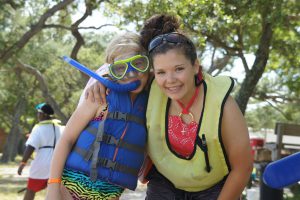
Youth volunteers, like our 4-H Camp counselors, are a great asset to the county 4-H program.
by Prudence Caskey | Nov 16, 2018
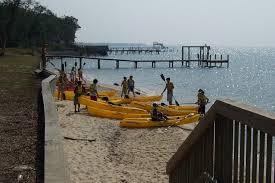
Photo credit UF/IFAS Washington County
Black Friday is only a week away, but you can get one gift taken care of TODAY!
Making my list…checking it twice…adding 4-H Camp for a kid who’s been nice!
This holiday season, parents and grandparents get swamped with requests for the newest toys or gadgets. Does it drive you crazy? So, I have a suggestion for you. Give the gift of 4-H Camp this year.
Life skills to last a lifetime
I began attending 4-H summer camp when I was eight. As a new and eager 4-H member, I learned so many life skills I still use to this day – like making my bed, cleaning up after myself, helping others, learning to be an independent thinker and most of all, leadership. At the age of eight, I was a leader! I was only leading myself, but I was responsible for myself. As I grew in the 4-H program, I became a camp counselor leading other youth. 4-H camp taught me so many wonderful skills as a child, and I only thought I was having fun! 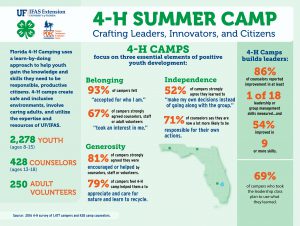
Fun, adventure (and education, too)
When a child attends 4-H summer camp, their week is full of fun and adventure. Youth will learn to kayak, dance and even shoot a bow! Many of our youth experience new and exciting adventures like learning how to build a fire and even what “Ga-Ga Ball” is all about. In addition to all the “fun” stuff, 4-H camp teaches life skills, like how to get along with others, independence and leadership. If you have a teen in your family, 4-H camp provides leadership experiences that can help them with college scholarships and applications.
4-H Camp keeps on giving
We’ve all seen Christmas gifts go unused shortly after they are taken out of the box. The gift of 4-H camp will not go unused and will keep giving every year as your child, grandchild, niece or nephew grows in the 4-H program. Contact your local UF/IFAS County Extension Office and find out how to register the child on your list for 4-H Camp today.
by aschortinghouse | Jul 27, 2018
GAGA BALL
If your youth has attended 4-H Camp Timpoochee or Cherry Lake with the UF/IFAS 4-H Camping Program, they’ve had the chance to play GaGa Ball. You’re probably wondering what kind of name is GaGa ball. It’s not just a made-up name. GaGa ball has a rich history. GaGa is translated from Hebrew as “touch-touch”. It’s said to have originated in Israel, and it has become a popular game at camps around the United States. GaGa Ball is a version of dodgeball and is just as fun.
LET’S PLAY!
GaGa ball is not only fun to say, but it is really easy to learn. First, you need a place to play. GaGa ball is played in a GaGa pit. Here’s just one of many articles on how to build your own GaGa Ball Pit. Next, you need a ball. GaGa balls are not specific, although a heavy duty dodgeball is recommended. The rules of the game vary place to place, but we play by the following rules at 4-H Camp:
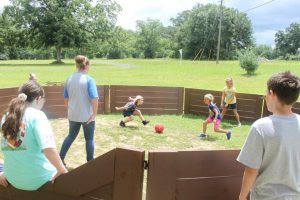
- You hit the ball with your hands only.
- If the ball hits you below the knee, you are out.
- If the ball bounces of the wall and hits you below the knee, you’re out.
- If you hit the ball out of the pit, you’re out.
- If you hit someone in the face, you’re out
- If the game is going slowly, the leader can call “Hands-In”.
Hands in means everyone who is already out can put their hands over the wall of the pit and try to get those still in the pit out.
Rules can be made and altered to fit the group that is playing the game although the first two rules are staples of the game.
WHAT’S THE BIG DEAL?
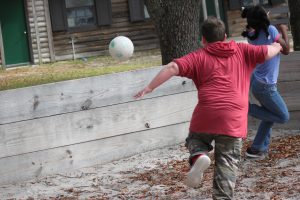
GaGa ball is a great way to expend extra energy during day camps, but it also is a great way to build and practice life skills. First off, youth are put in situations in every game where they have to practice decision making, discipline, resiliency and many other life skills 4-H strives to instill in our youth. Of course they have to practice their conflict resolution skills as there will inevitably conflicts that arise from their competitive natures. Most importantly, playing GaGa ball helps kids practice a healthy lifestyle. GaGa ball teaches many important lessons, and is a bunch of fun. So when you hear someone say, “Let’s play GaGa ball!”, give it a try and embrace the challenge.
Learn more about the history of GaGa Ball
by Melanie Taylor | Jun 8, 2018
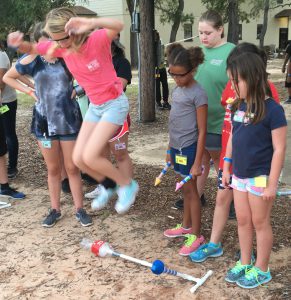
Gulf and Franklin County campers shooting rockets at Camp Timpoochee in June 2017.
As the school year wraps up, you’re likely trying to fill up your child’s summer with fun and educational programs. Fortunately, you’ll find a variety of day and residential summer camps out there. Does the thought of sending your child to camp cause anxiety for your or your child? If so, let’ me give you some tips to eliminate those concerns.
First, summer day camps and residential camps can be some of the most memorable events in a child’s life. Some children make memories and friends that last a lifetime. But as a parent, you need to feel comfortable about the camp you send your child to.
When starting the camp selection process, begin with your child’s interests. Make sure you know the camp will provide activities that will enhance your child’s personality and maturity level. Including your child in the process will help them feel more secure and excited about what camp will offer them. This will also help get rid of some of their anxiety because they’ll know what to expect (especially if they have never attended camp before).
Here are questions recommended by the American Camping Association (ACA) to help you make the best summer camp decision.
Questions to Consider in Selecting a Residential Camp:
- What locale do I want to consider? (mountains, oceanfront, distance from home, etc)
- Do I want a traditional camp that gives my child a wide variety of experiences, or do I want to select a specialty camp that focuses on a particular activity or set of skills?
- What size enrollment will make my child feel comfortable?
- How rustic do I want the camp to be?
- How structured do I want the program to be? Does my child like to have lots of choice in the activity schedule?
- Is my child ready to sleep away from home for an extended stay? (This will help you to select either a resident or day camp setting.)
- What session length will appeal to my child and to our family plans for the summer? (One week? Eight weeks? Length of day?)
- How can I stay in touch with my child during camp? Does the camp allow mail, phone calls or e-mail? Does the camp have parent visitation days?
- How will the camp meet my child’s special dietary or physical needs?
- What is my budget for camp tuition? (Remember, many camps offer financial aid.)
Questions to Consider in Selecting a Day Camp:
Day camps offer experiences unique from residential camps. Because of this, there are specific points to consider when choosing a day camp – transportation, overnights, swimming lessons, food service, horseback riding, group pictures, t-shirts, extended care, field trips, etc.
- Does the American Camp Association accredit the camp? (ACA has specific standards applicable only for day camps.)
- What training does the staff receive on safety, supervision, counseling, problem solving and other issues unique to working with young children?
- Is the price all-inclusive or are there extra charges?
- If transportation is offered, where is the closest pick-up location?
- Does the camp have an “express bus” which transports children quickly?
- If before and after-camp extended care is offered, who is with the children and what activities take place?
- Is lunch served, or do campers bring their own sack lunch? Are snacks and drinks provided?
- If the camp offers swimming, are there swimming lessons, or is it simply recreational swimming?
- Are campers in a group with a counselor all day? Or, are campers free to go from one activity to another with appropriate supervision? In this case, who would you talk to if you had a question or concern about your child?
- Is an open house offered before camp starts where you can meet your child’s counselor and van/bus driver?
- Are parents allowed to drop by for visits or is there a special parent visitation day?
Along with the above questions, you should also know that in the state of Florida, summer camps are not inspected or regulated by the Department of Children and Families (DCF). This makes it even more important for parents to gather information about the quality and safety of the program on their own. Parents should check to see if they are welcome to visit and observe the camp in action or attend activities with their child at any given time including water activities.
DCF suggests you ask these questions:
- What the programs health, safety and nutrition policies and procedures?
- Is the staff screened?
- What are the staff/child ratios and group sizes of the program?
- Is the staff well-trained?
- Is the program licensed or accredited?
- Are parents welcome to visit? Are family activities offered?
- Is there a daily lesson plan?
- Is the facility adequate for the number of children enrolled?
- What are the hours of operation, fees and payment procedures?
Download the Selecting Summer Care for School-Age Children: A Quality Checklist at http://www.dcf.state.fl.us/programs/childcare/docs/SummerChecklist.pdf.
Because you should know – Florida law does require summer camps to conduct background screenings of all camp personnel, including owners, operators, employees and volunteers. Volunteers providing less than 10 hours of service per month do not need to be screened as long as they are always within sight of a person who meets the screening requirement. In the state of Florida, the camps supported by UF/IFAS Extension meet each of the standards above.
The above questions and items to consider should help you in the camp selection process. Always feel confident in asking any questions – as the parent, you have the right to feel confident in your child’s camp selection.
As you begin your summer camp search, remember to check out the day and residential camping programs offered by your local 4-H program. We are confident in our volunteers and staff competency and would love to have your child participate in our safe and fun-filled summer camps. Contact your local Extension Office for more details.
Resources for this article may be found at: www.acacamps.org and www.myflfamilies.com.
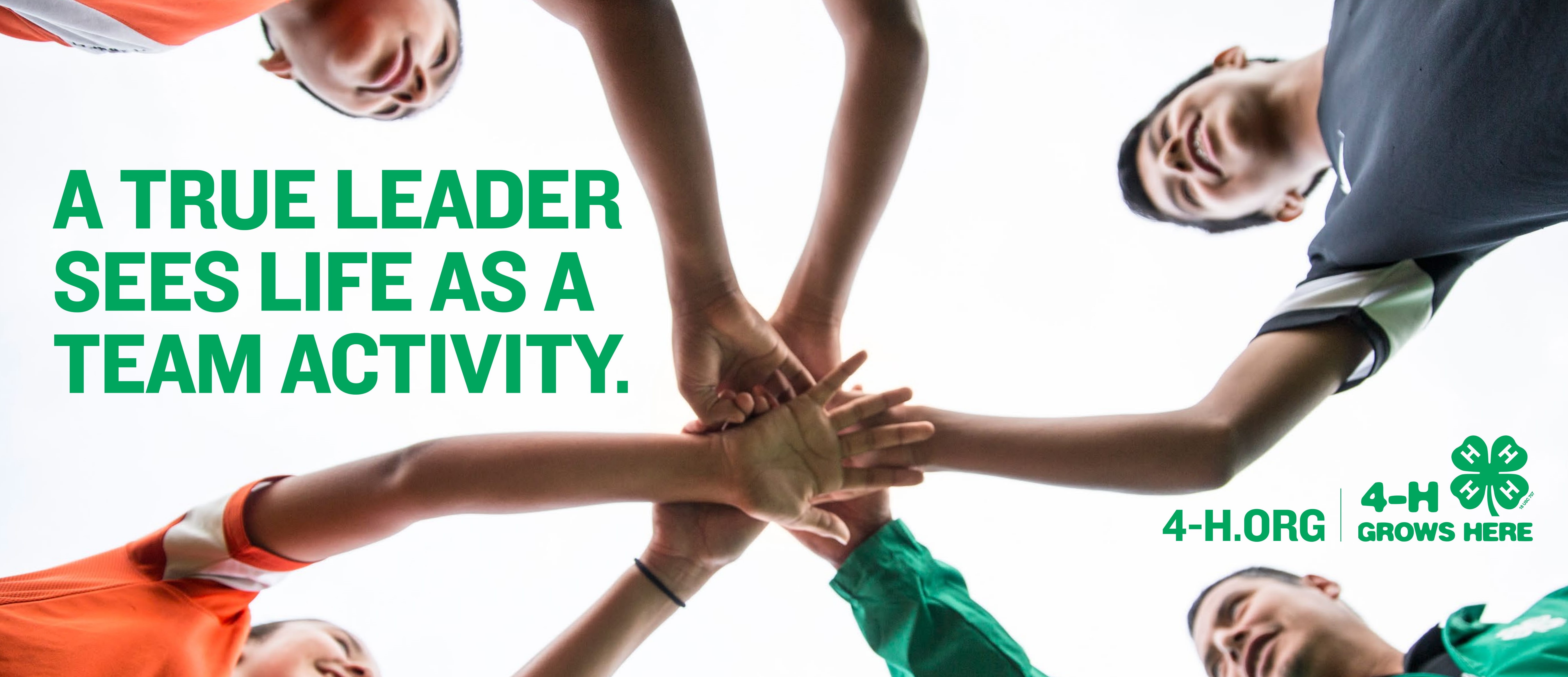
by Jena Gilmore | Jun 6, 2018
Graduation has come and gone for our newest 4-H Alumni who are beginning their journeys in college, technical school or the workforce. Our 4-H Seniors have given so much to their county, district and state programs over their years of service. Here are a few ways to make sure your Senior gets all he/she can from their Senior year in 4-H and beyond:
Final 4-H Event
4-H University – July 30-August 2nd
http://4huniversity.com/
Florida 4-H University is a week-long overnight event for young adults held at the University of Florida. Attendees will have the opportunity to participate in educational workshops led by University of Florida faculty, explore career opportunities, lead community service activities, interact with youth from all over the state, and have fun while developing critical life skills that will help them become productive and engaged citizens in their communities, their country, and their world.
To be considered eligible for participation in Florida 4-H University, participants must be between the ages of 14 – 18 by September 1st of the previous year and must not have graduated high school. Late registration closes June 8th.
Camp Staff
Were you a 4-H camper? Then consider coming back as staff next 4-H camp year. Our 4-H residential camps are always looking for dedicated applicants with youth and youth program experience.
http://florida4h.org/camps_/jobs/summer-camp-staff-application/
Volunteer with 4-H
Now that you’ve made the transition from 4-H member to alumni, check with your 4-H Agent for opportunities to give back to the program that grew you into a #TrueLeader. If you’ve moved away from your home county, find the 4-H agent where you are to see how you can volunteer.
Other Resources
Collegiate 4-H – http://florida4h.org/youth_/collegiate/
Volunteer – http://florida4h.org/volunteers_/sfyl.ifas.ufl.edu/find-your-local-office
Alumni – https://4-h.org/4-h-alumni-community/4-h-alumni-resources/
Find a 4-H Agent – http://sfyl.ifas.ufl.edu/find-your-local-office/
by Niki Crawson | Jun 1, 2018
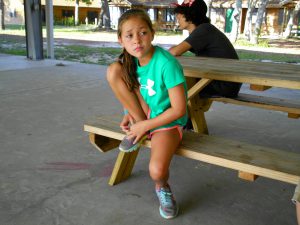
Oh, the distress and worry that begins the feverish panic of the homesickness bug! It typically bites the week before camp for most parents and campers and hits its highest peak by day two of camp. Unless quarantined, the homesick bug runs rampant and causes quite a disturbance during camp week. There is good news: homesickness is like most any other mild allergy or summer cold; it can be prevented with the right measures. If it does appear, it can be handled quickly so campers are on the mend and back to enjoying the fantastic summer activities of camp life with little disruption!
Campers who overcome homesickness and finish the entire week of summer camp successfully feel a sense of accomplishment and can also be praised for their demonstrating independence and problem solving abilities. These are life skills that 4-H residential summer camp strives to teach our youth so they can grow into successful leaders of tomorrow!
Homesickness is a normal part of overnight camp. Here are a few suggestions on how you can help manage homesickness to keep your children healthy and happy this summer!
PREPARATION IS PREVENTATIVE

By going to camp orientations, meeting with camp staff, reviewing the camp schedule, and answering questions can help your child prepare for what to expect at camp. If possible, meet with the staff in charge to discuss any issues that may be giving your child anxiety about camp, or let us know of any issues at home that may be stressing your child. This might include include being assigned to a cabin with a friend, needing a nightlight when sleeping, etc. Having children involved in these discussions with staff in private will eliminate a lot of the anxiety, and in turn, reduce the chances and/or intensity of homesickness.
You can also allow your child to demonstrate independence early by letting them pack their own camp suitcase. This will allow them to feel more in control of their situation and the decisions they are going to make for a week, boosting their confidence. (Of course, you will want to check the bag for items they may have forgotten.)
POSITIVE REINFORCEMENT IS REASSURANCE
Parents can unwittingly set their children up for homesickness failure before camp even begins with just a few simple negative statements. Statements from parents expressing their anxiety or sadness about their children leaving home can be damaging and ultimately lay a foundation homesickness. Please don’t be this parent. Instead, reassure your child they’ll do great at camp, and reinforce that they will learn new things and become more independent.
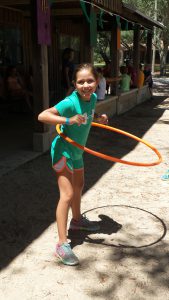
CONFIDENCE IS CONTAGIOUS
Parents, remain confident from the time you sign your child up for camp until his/her children return home. Emphasize the positives of the camping experience such as making new friends, learning new activities, swimming, etc. Keep your camper excited about the experience to help diminish the anxiety associated with the week.
Avoid giving your child the option of going home early from summer camp if he/she gets upset, sad, or homesick. Instead, speak with the 4-H agent to discuss possible actions that can be taken to remedy the emotions that the camper is feeling. Only as a very last resort should the parent speak with the child when a child is homesick; more often than not, it makes the homesickness worse.
TRUST YOUR 4-H STAFF
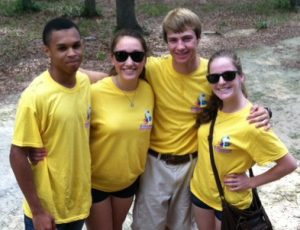
One of the hardest things to do may be one of the most important aspects of a successful summer camp for your child: trust your camping staff. From the beginning of the camp sign-up process, you can meet with your 4-H Agent or person overseeing the camping week. This will help you and your child feel more comfortable in their camp week. It will also help your 4-H Agent or lead staffer know more about their campers!
4-H residential summer camps are designed to support positive youth development to develop independence, promote a sense of belonging in a group setting, encourage generosity, and facilitate the mastery of targeted life skills. Programs at camp teach 4-H’s fundamental approach of “learn by doing” through safe, fun, educational environments.
To find out more information about 4-H residential camping programs, please visit http://florida4h.org/camps_/ or contact your local UF IFAS County Extension Office.
RESOURCES
http://florida4h.org/camps_/
https://www.acacamps.org/press-room/how-to-choose-camp/homesickness
 Summer camp…memories cherished and never forgotten. Camp fires, swimming, canoeing and kayaking, roughing it old-school in cabins and bunk beds, camp songs and skits around the fire, life-long memories and friendships…these are some of the experiences your child can have at 4-H Camp Timpoochee or 4-H Camp Cherry Lake this summer!
Summer camp…memories cherished and never forgotten. Camp fires, swimming, canoeing and kayaking, roughing it old-school in cabins and bunk beds, camp songs and skits around the fire, life-long memories and friendships…these are some of the experiences your child can have at 4-H Camp Timpoochee or 4-H Camp Cherry Lake this summer!











